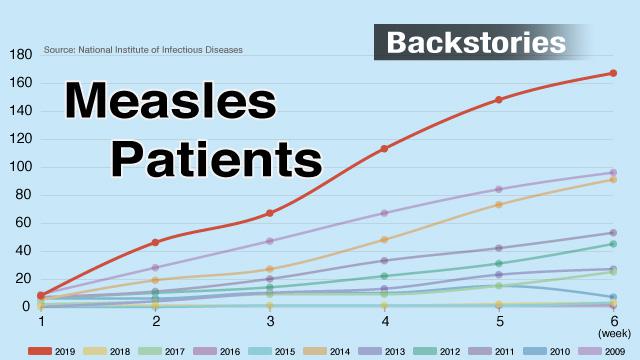Location of infected patients
The map of Japan shows measles patients by region, with the number of affected areas growing day by day. In February this year, 167 cases were reported across 20 prefectures in a single week.
Mie Prefecture in western Japan topped the list with 49 cases, Osaka had 47, Aichi had 17, while Tokyo had 11.

Risk of complications
Catching measles during pregnancy causes a higher risk of miscarriage or premature birth. If the virus gets into the lungs or brain, it can trigger a more serious condition later in life.
Around one in one-hundred-thousand measles patients develop subacute sclerosing panencephalitis, a central nervous system condition directly linked to the virus, five to ten years later.
Missed opportunity
Aya Tabuse, 38, was one of those and has been bedridden for more than 20 years.
Her mother, Junko, told NHK how serious measles can be. Aya contracted the disease when she was 11 months old, just a few weeks before she was supposed to receive the measles vaccination, as the shot is legally available only after a child turns one. Aya was not vaccinated after becoming infected
She recovered and had a healthy and happy childhood. She joined the track-and-field team at junior high school -- things were going well.
But when Aya was 16, she realized there was something wrong. She started getting cramp in her legs. It was just the initial symptom and she was told the cause was the measles she had as a baby.
Aya's mother says: "Her symptoms progressed rapidly. Ten days after she was hospitalized, a doctor gave us the diagnosis. The next month, she couldn't walk."
The symptoms spread all over her body. She became unable to speak or breathe on her own within a year.
Her mother says she wants all parents to vaccinate their children to help eradicate measles.

Worldwide Outbreak
Authorities in Yokoyama City near Tokyo confirmed earlier this month that a girl who had returned to Japan from the Philippines on February 11th had the virus. The foreign ministry is calling on anyone visiting the country to seek medical attention immediately if infection is suspected.
Recent years have seen measles outbreaks spanning Asia, North America and Europe.
The Philippines have recorded more than 8,400 measles cases this year, of which 136 people have died.
The death toll is five times as high as the same period last year. The health ministry says about half of the cases have been infants between the ages of 1 and 4.
Philippine President Rodrigo Duterte delivered a televised message on February 15th, urging parents to have their children vaccinated and warning of the possible deadly complications of the infection.
Authorities say that since 2010, there have been no confirmed infections by the virus usually seen in Japan, meaning the current cases are likely linked to measles brought in from abroad.

Measures in Japan
The National Institute of Infectious Diseases is urging people who have not been vaccinated to do so immediately.
Nobuhiko Okabe, director general of Kawasaki City Institute for Public Health, says measles is ten times more contagious than the flu. He says wearing masks and hand-washing might help, but there are no totally effective ways of preventing the virus spreading. Vaccination and the immunity it brings are by far the most effective ways of avoiding measles.

